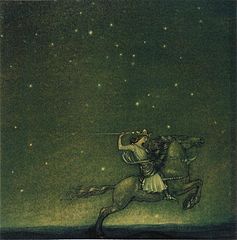Many people have trouble reading the Classics, both ancient and modern. This is because we live in a culture of instant gratification. We are used to 
reading passively. The key to understanding literature prior to the age of instant gratification is ‘active’ reading. People must change the way they approach these works. They need to change their mindsets. They need to read actively.
Think of all the great literature that has been written prior to the 20th century, going all the way back to Homer and the dawn of Western literature over 2600 years ago.
You don’t know what you are missing!
Most people think that fantasy, as a genre, was born in the 20th century with the advent of the great imagineer, J.R.R. Tolkien. Not true. The first great work of fantasy literature was Homer’s second epic, the Odyssey. And there have been many great imagineers over the ages. One of the greatest is the English visionary poet and painter, William Blake. But people are turned off these authors because they are too ‘difficult’.
All that is needed is some active reading and you can access these works and their like. You don’t need to be an English professor. You don’t even need to be an English graduate. All you need to be is someone who loves to read. So, what exactly is active reading? Basically, it means thinking about the text. It means asking questions. It means using your own knowledge and experience to make sense of the text, to make it meaningful. It means constructing meaning out of what is already inside you and what you are encountering in the text.
Making the transition from passive to active reading is easy and incredibly rewarding. You don’t need to spend three years in college. It’s just a matter of using your God given intellect to extract meaning from the text, to see shapes and patterns in it. This is true ‘reading’, not just taking in words but actively engaging with them.
We’ve already mentioned Blake. A lot of his poetry is challenging but if you take the active approach it is immensely rewarding. A good place to start active, analytical reading is his Songs of Innocence and Experience. They seem simple on the surface but if you take the time to really read them you will discover hidden depths and layers. New meanings will spring out of the text.
Reading the ancient Classics is also a good place to start, as many classical works have a mechanical quality: they are full of mechanisms and devices which makes them easier to analyse. They also tend to be very structured which makes it easier on the active reader. Of course, these are vast generalisations but they serve our purpose here and hopefully they will embolden you to read the likes of Homer, Sophocles and Virgil.
The important thing to remember is not to be intimidated by literature that is pre 20th century. All you need to do is approach it with a different mindset. Get into a different way of thinking. An objective way of thinking. That and, of course, a library ticket!



 strikes me as true.
strikes me as true.





 collection, Door into the Dark. I think the key to understanding the poem is the Eleusian mysteries practised by the ancient Greeks. The man in the poem is basically giving the role of the corn goddess, Demeter, to the woman, though she doesn’t know it. It’s a measure of how much he loves her but she is mystified.
collection, Door into the Dark. I think the key to understanding the poem is the Eleusian mysteries practised by the ancient Greeks. The man in the poem is basically giving the role of the corn goddess, Demeter, to the woman, though she doesn’t know it. It’s a measure of how much he loves her but she is mystified.